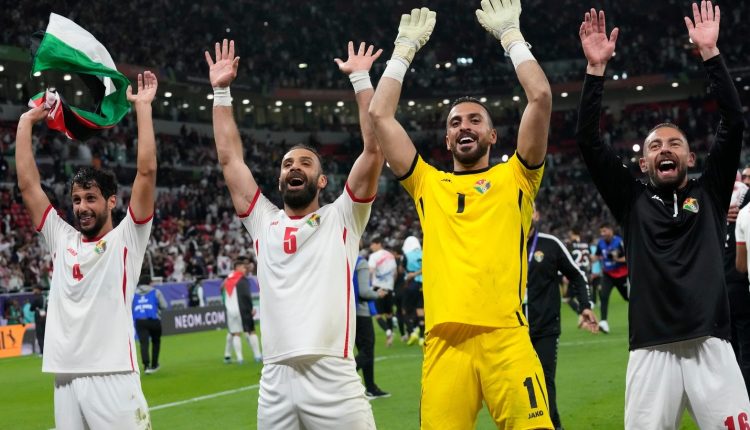“Football, bloody hell!” turns 25 this year and Alex Ferguson’s quip after the 1998-99 Champions League final is an apt description of how the Africa Cup of Nations and the Asian Cup have unfolded on way to this weekend’s finish.
Who would have thought Equatorial Guinea’s Emilio Nsue, who plays in the Spanish third division, could win the golden boot or that South Africa and Democratic Republic of Congo would make the semi-finals? Shift to Asia and Tajikistan, Indonesia, Syria and Palestine survived the group stage showing that expanded continental competitions have helped teams bridge the gap with heavyweights.
Nothing though would match Jordan, who had never won a knockout game in the Asian Cup before 2024, being a match away from lifting the trophy.
Since 1996, every team that beat Iraq has made the Asian Cup final. Since 2007, every team that beat South Korea has won it. No pressure but here’s looking at you Jordan.
Bossing the game
Tuesday’s semi-final at an Ahmad bin Ali Stadium packed with their supporters – there are nearly 70,000 Jordanians living in Qatar – ended with chants of ‘Mousa! Mousa!” It’s been that kind of a season for Mousa Al-Tamari who plays for Montpellier having graduated from the leagues in Cyprus and Belgium. Three goals and an assist in Ligue 1 is a good initiation into Europe’s top five. Jordan’s only Europe-based player has brought that form to Qatar.
Al-Tamari’s solo effort for the second goal encapsulated South Korea’s effete defending but also had the kind of nonchalance not usually associated with first-time semi-finalists. The assist for Yazan Al-Naimat’s superbly chipped opening goal was also his as Jordan, ranked 87th to South Korea’s 23, bossed from the off. They won almost every one-on-one battle in the first half hour, said South Korea coach Juergen Klinsmann.
“The X-factor was we didn’t need to give South Korea more respect than needed,” said Hussein Ammouta, Jordan’s 54-year-old Moroccan coach.
They had scored twice against South Korea in the group league, Klinsmann’s men escaping with a draw after stoppage-time a self-goal. Against a team that had relied on late goals and extra-time to go deep, belief certainly was not in short supply for Jordan. Not even without top scorer Hamza Al-Dardour, sent home after the round of 16 following a spat with the coach, and central defender Salem Al-Ajalin and forward Ali Olwan who were suspended. (Bayern Munich’s Kim Min-jae was suspended but given South Korea’s strength in depth, it wasn’t the same thing).
With 30% of the ball, Jordan managed seven shots on target. South Korea had none and goalkeeper Jo Hyeon-woo, who once denied Al-Naimat with his face, was their best player. Apart from Lee Jae-sung’s header hitting the upright and a penalty appeal overturned, South Korea looked tentative as if waiting for Premier League stars such as Son Heung-min, Hwang Hee-chan and Paris St Germain’s Lee Kang to spark into life.
Jordan pressed from the start, stayed compact without the ball and were sharp on the break. It has been the story through the knockout rounds for the team from the Hashemite kingdom which qualified for the round of 16 as one of the four best third-placed sides. Ask Iraq who were sucker-punched by two extra-time goals.
Roller-coaster ride
None of this looked possible in the lead-up to the Asian Cup, or maybe till Aymen Hussein’s red card that left Iraq 2-1 up but with a player short. Before Doha, Jordan had gone nine games without a win, a run that included eight defeats. They had conceded 23 goals and scored six in those games. But strange things have happened in tournament football. Senegal (2002), Morocco (2022), North Korea (1966) are some examples from the World Cup. Qatar winning the Asian Cup in 2019 is another.
That said, Jordan did make the quarter-finals of the Asian Cup twice, on debut in 2004 when they were ranked 40th in the world and 2011. In 2004, they were leading 3-1 in the tie-breaker when it was shifted from one goal to another after Japan coach Zico and captain Tsuneyasu Miyamoto convinced the referee that the pitch on the side the tie-breaker had started was in poor condition. Japan won the shootout in sudden death after Jordan squandered a 3-1 lead and went on to become champions.
Proof again of why success in tournament football is different from sustained development came in Jordan not qualifying for the 2007 finals and being eliminated in the group stage in 2015. In between, they made the inter-continental play-off for the 2014 World Cup but lost the two-leg tie 0-5 to Uruguay.
Al-Wehdat and Al-Faisaly, clubs that dominate Jordan’s top league having won 37 of the last 40 editions, provided most of the players for this squad. Jordan’s pro league has 12 teams and the next tier 14. In the AFC Cup, Indian and Jordanian clubs have met with East Bengal beating Al-Wehdat away once.
Making the final, Ammouta said, was the fruit of many years but proof of how far Jordan need to go lay emphasis on investing in infrastructure and paying attention to youth teams. “We should start planning how we will produce players who will play in the world’s biggest leagues,” he said.
The Doha fairytale could be the beginning of good things.


